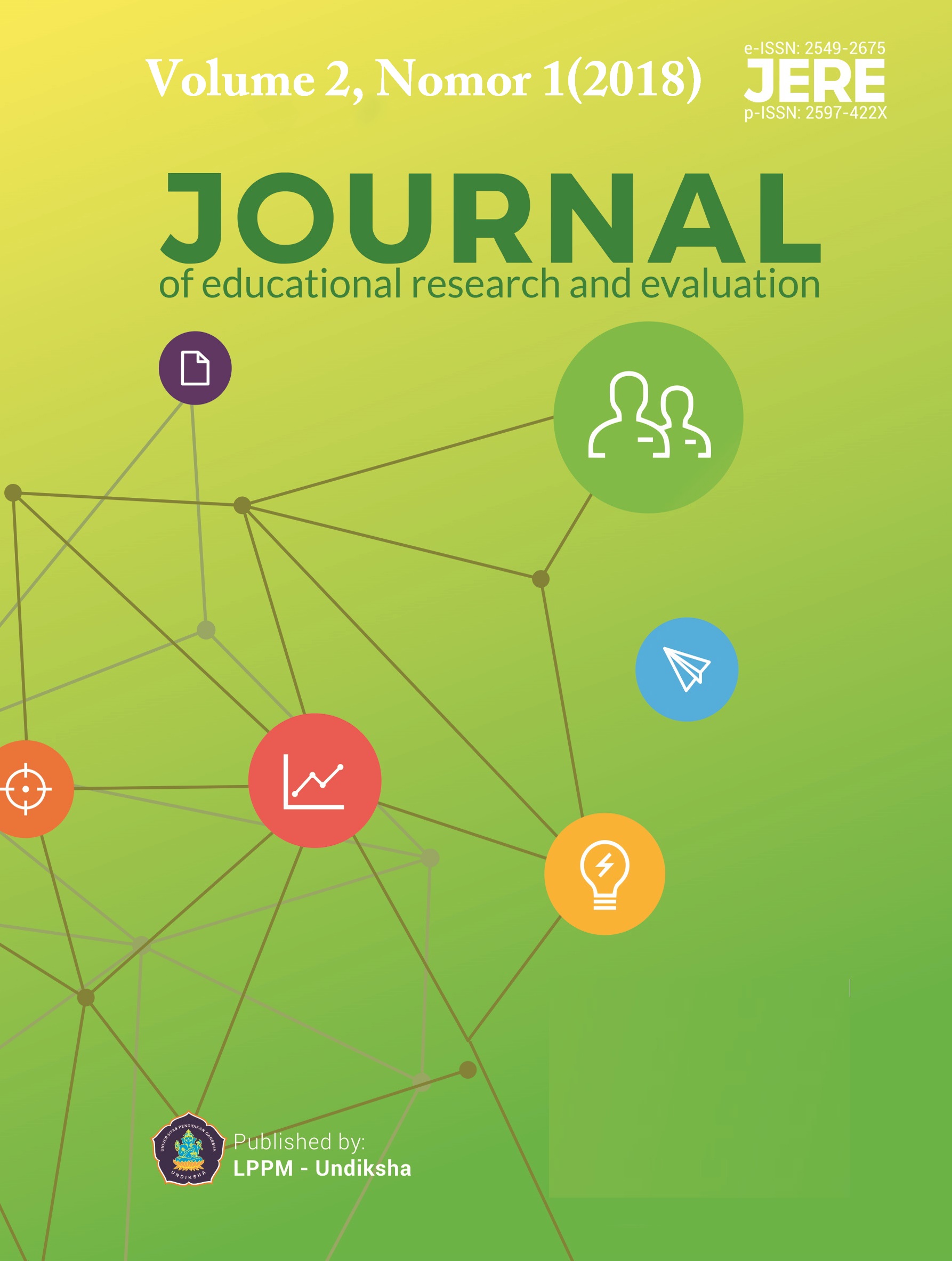The Effect of Problem-Based Spot Capturing Models on Creative and Care Character of Students in Elementary School
DOI:
https://doi.org/10.23887/jere.v2i1.13154Keywords:
Problem-Based Spot Capturing Models, CharacterAbstract
This study aims to determine the impact of applying problem-based spot capturing models in teaching social science in order to develop creativity and caring of students in elementary school. The experimental research was carried out for four weeks by using problem-based spot capturing models learning in two groups is experimental group (n = 24) and control group (n = 23). This study used quasi experimental method with pre-test and post-test control group design. The research instrument was taken from observation and questionnaire then the data was analysed by using qualitative descriptive percentage. Based on the data, the researchers figure out that a teacher plays an important role in developing the character of the students through the learning design. In addition, there are differences in the higher score obtained by the experimental group than the control group on creative and care characters by using problem-based spot capturing models. Students also gain an improvement in technology use and skills in social science class by using the problem-based spot capturing models.References
. Sanchez, T.R. 2005. Facing the Challenges of Character Education. International Journal of Social Education 19(2), 106–111. https://eric.ed.gov/?id=EJ718739.
. Benninga, J.S., Berkowitz, M.W., Kuehn, P. & Smith, K. (2006). Character and Academics: What Good Schools Do. Phi Delta Kappan 87(6), 448–452.
http://www.fresnostate.edu/kremen/bonnercenter/documents/Character_and_Academics.pdf.
. Chu, S., Chow, K., Tse, S.K., Kuhlthau, C.C. 2008. Grade Four Students’ Development of Research Skills through Inquiry-Based Learning Projects. Hongkong: School Libraries Worldwide 14(1), 10–37.
. Widiasmadi, Nugroho. 2010. Spot Capturing Metode Dahsyat Mencetak Otak Super. Yogyakarta: Kawah Media.
. Hmelo-Silver, C. 2004. Problem-based learning: What and how do students learn? Educational Psychology Review, 6, 235-266. DOI= https://doi.org/10.1023/B:EDPR.0000034022.16470.f3.
. Andrew,Armitage. 2013. Conscientization, Dialogue and Collaborative Problem Based Learning. Journal of Problem Based Learning in Higher Education, 1, 5-15.
DOI= http://dx.doi.org/10.5278/ojs.jpblhe.v1i1.270.
. Lickona, Thomas. 2012. Educating for Character How Our School Can Teach Respect and Responsibility. New York: Batam Books.
. Zumbach, J., Kumpf, D., & Koch, S. C. 2004. Using Multimedia to Enhance Problem- Based learning in Elementary School. Information Technology in Childhood Education Annual,1, 25-37. https://www.sbg.ac.at/mediaresearch/zumbach/download/1999_2006/journals/Zumbach.pdf.
. Walter C. Parker. 2012. Social Studies in Elementary Education. 14. Pearson. New York.
. Levstik, L.S. 2008. Handbook of Research in Social Studies Education. 01. Taylor&Francis Group plc. UK.
. Mindes, G. 2014. Social Studies for Young Children: Preschool and primary curriculum achor. 02. 1st Books Library. Maryland.
. Megawangi, Ratna. 2004. Pendidikan Karakter. Jakarta: Indonesia Heritage Fondation.
. Megawangi, Ratna. 2003. Pendidikan Karakter untuk Membangun Masyarakat Madani. Bandung: IPPK Indonesia Heritage Foundation.
. Goh, K. C., D’Rozario, V., Ch’ng, A., & Cheah, H. M. 2009. Introduction. In K. C. Goh, V. D’Rozario, A. Ch’ng & M. Cheah (Eds.), Character Development Through Service Learning and Experiential Learning (pp. 1–6). Singapore: Prentice Hall. DOI= http://dx.doi.org/10.5278/ojs.jpblhe.v1i1.270.
. Cohen, L., Manion, L. ve Morrison, K. 2005. Research Methods in Education (5th Edition). London, NewYork: Routledge Falmer.
. Sukmadinata, Nana Syaodih. 2005. Metode Penelitian Pendidikan. Bandung: Rosdakarya.
. R.R. Hake. 1999. Analyzing Change-Gain Scores. USA: Dept. of Physics, Indiana University. http://www.physics.indiana.edu/~sdi/AnalyzingChange-Gain.pdf.
. Dabbah, N. H., Jonassen, D. H., Yueh, H. P. & Samouilova, M. 2000. Assessing a problem-based learning approach to an introductory instructional design course: A case study. Performance Improvement Quarterly, 13(3), 60-83. DOI= 10.1111/j.1937-8327.2000.tb00176.x.
. Kamaruddin SA. 2012. Character Education and Students Social Behavior. Journal of Education and Learning. Vol.6 (4) pp. 223-230. http://journal.uad.ac.id/indeks.php/EduLearn/article/view/527.
. Pianta, R.C. & Stuhlman, M.W. 2004. Teacher–child Relationships and Children’s Success in the First Years of School. School Psychology Review 33, 444–458
. Railsback, J. 2002. Project-based Instruction: Creating Excitement for Learning. Northwest Regional Educational Laboratory, Oregon. http://educationnorthwest.org/sites/default/files/projectbased.pdf.
Downloads
Published
How to Cite
Issue
Section
License
Authors who publish with the Journal of Evaluation and Research in Education (JERE) agree to the following terms:
- Authors retain copyright and grant the journal the right of first publication with the work simultaneously licensed under a Creative Commons Attribution License (CC BY-SA 4.0) that allows others to share the work with an acknowledgment of the work's authorship and initial publication in this journal.
- Authors are able to enter into separate, additional contractual arrangements for the non-exclusive distribution of the journal's published version of the work (e.g., post it to an institutional repository or publish it in a book), with an acknowledgment of its initial publication in this journal.
- Authors are permitted and encouraged to post their work online (e.g., in institutional repositories or on their website) prior to and during the submission process, as it can lead to productive exchanges, as well as earlier and greater citation of published work. (See The Effect of Open Access)











